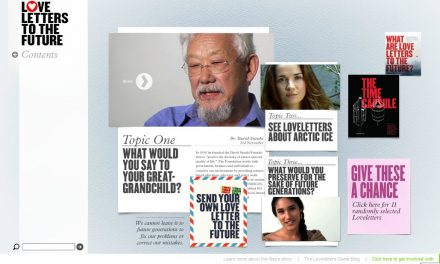In our article about the game Extrasolar, we already told you how you can explore a very distant but beautiful world throughout exploring an unknown planet somewhere in space. Today we are happy to welcome the creative mind behind that game to our Transmedia Storytelling (Berlin) community: Please say hello to Rob Jagnow. Connect with him about storytelling, funding and space exploration.
Describe yourself in less than 140 characters:
I’m the founder of Lazy 8 Studios and the producer behind the award-winning indie games Cogs and Extrasolar.
Who are you and why are you a transmedia storyteller?
I’m Rob Jagnow, the founder of Lazy 8 Studios. I’m a game developer who started off with more traditional puzzle games and stumbled into transmedia, almost by accident.
In our latest game, Extrasolar, you play a central character in a story of mystery and conspiracy. A private space exploration company has landed dozens of rovers on the surface of an alien planet and they’re looking for volunteers to help drive them. You can apply to the program and, through a Web interface, you tell your rover where to go. As you play, you start to uncover the mysteries of the alien planet, as well as the characters that you’re interacting with back on Earth.
When I first pitched the game to my team, I had never heard of ARGs or transmedia, so I had a lot of research to do. I drew inspiration from I Love Bees, Majestic, Perplex City, and other predecessors. I treated these projects as case studies, trying to figure out how to tell a great transmedia story, but also trying to understand what caused some of these projects to fail as businesses.
What are the main features that depict a transmedia storytelling project from your point of view?
The word “transmedia” is fairly young, so there’s still a lot of debate about what it means. For the time being, I think it’s good for the meaning to be flexible so that we don’t restrict our creative ideas too early in this emerging entertainment trend.
For me, I think of the word in its most literal form — a story that is told through multiple forms of media, though not necessarily multiple platforms or devices. Extrasolar can be played entirely through the Web on just one device, but the story plays out through websites, written messages, PDF files, terminal systems, photos of an alien planet, and videos from live actors.
Did your work change within the last years?
Yes. Lazy 8 Studios started out developing more traditional games. We made Cogs and also did contracting work on some bigger titles like Frontlines: Fuel of War and The Daring Game for Girls.
When I came up with the concept for Extrasolar, it led me to the emerging world of ARGs and transmedia. Purely by chance, when Extrasolar was still an early prototype, I was lucky enough to be selected to play a role in the development of the Portal 2 launch ARG. That really opened my eyes to new ways of telling a story through a variety of media channels.
In our real lives, our interactions with our friends and colleagues play out through many different media forms — Facebook, Twitter, emails, and of course face-to-face encounters. Humans are very good at weaving all of these interactions together into a coherent picture. Telling a fictional story with a similar variety of channels helps add to the realism of the experience, allowing the story to be woven into our everyday lives.
Are/Were there any obstacles yet that you’d wish to find some others to help you with?
Funding and outreach have both been challenges to us. These two challenge are interrelated — if we could effectively reach a larger audience, then our funding problems would be fixed.
A few years ago, it was much easier and cheaper to use marketing channels to acquire new players. But as huge corporations have entered the mobile games space, they’ve poured money into advertising. The market became saturated and it became prohibitively expensive to get new users. Some of our advertising campaigns are doing well, but we haven’t quite proven that we can reach a break-even point on our advertising costs.
For funding, we’re currently trying to raise money through a Kickstarter campaign. Specifically, we’re trying to build up the production budget for season 2. Unfortunately, the campaign currently looks likely to fail unless we can get the attention of the media. If the campaign fails then, for the first time in the studio’s history, we’ll probably start looking for outside investment.
What kind of contacts would be helpful for you to find? Why?
We could benefit from having marketing contacts who are intimately familiar with the transmedia space. To be honest, most of the marketing companies that reach out to us don’t fully understand the experience that we’re trying to create.
We’re also starting to look for potential investors. Most of our player statistics are remarkable — 15% of our players optionally choose to upgrade to a paid premium account. More than 25% of the players who start the game finish it — a serious commitment considering that the average completion time is 27 days. If we can just get enough funding to produce season 2, then we can add a paywall at the start of the new content and it should be exactly what we need to make our advertising budget pay off.
How to get in contact with Rob Jagnow Rob Jagnow:
Based in the US:
3055 Market St.
94114 San Francisco
U.S.A.
Phone:
Web: http://www.lazy8studios.com
E-Mail: rob (at) lazy8studios (dot) com
FB: https://www.facebook.com/Lazy8Studios
TW: https://twitter.com/@lazy8studios
G+: https://plus.google.com/+Lazy8StudiosUSA
Please follow this link to our short interview form, in case you want to introduce yourself to the community too. If your introduction will be published within the 9th of September and the 1st of October, you will also take part in our “Your ticket to the Conducttr Conference ’14 (in London)” competition.
Photo-Credits: Tomas Izo, All Rights reserved







Recent Comments